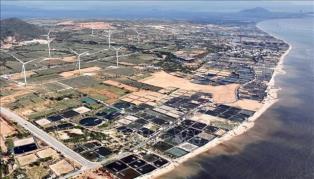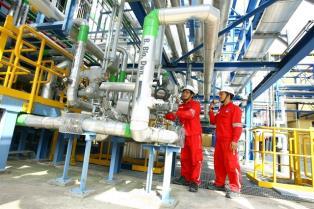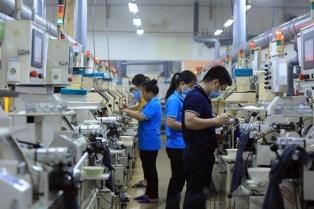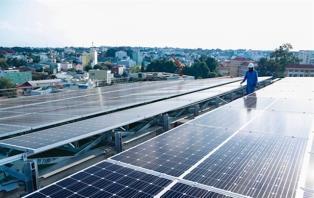Việt Nam, Ireland strengthen cooperation to develop sustainable food systems
The two sides will focus on four key areas: institutional improvement and food system coordination; science, technology and digital transformation; developing a skilled workforce; and strengthening business links within the South–South cooperation framework.
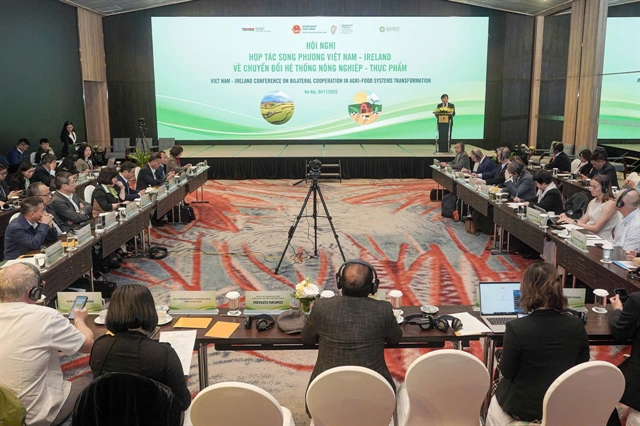
HÀ NỘI — Việt Nam and Ireland have agreed to elevate their cooperation in agriculture and food from project-based initiatives to a strategic policy partnership, aiming to jointly shape institutions and frameworks for a transparent, responsible and sustainable food system.
Nguyễn Đỗ Anh Tuấn, director of the Department of International Cooperation under the Ministry of Agriculture and Environment, announced the agreement at a conference on transforming the agriculture and food system held on November 4 by the ministry in collaboration with the Embassy of Ireland in Việt Nam and Sustainable Food Systems Ireland (SFSI).
The change would focus on four key areas: institutional improvement and food system coordination; science, technology and digital transformation; developing a skilled workforce; and strengthening business links within the South–South cooperation framework.
Tuấn also confirmed Việt Nam’s determination to build a modern and responsible agricultural sector through major national programmes, such as the initiative to produce one million hectares of low-emission and high-quality rice, a project to promote circular agriculture, and the digital transformation of the sector.
He said the conference was both a reflection on the achievements of the Ireland-Việt Nam Agrifood Partnership (IVAP) over the past decade, and an activity to help deepen cooperation in the future.
Agriculture remains a pillar of Việt Nam’s economy, providing livelihoods for over 60 per cent of the population and contributing nearly 12 per cent of GDP.
Meanwhile, Ireland has developed an advanced and sustainable agricultural model based on three key principles: links between production, processing, distribution, consumption and resource regeneration; multi-stakeholder collaboration among government agencies, businesses, farmers and research institutions; and a transparent, evidence-based monitoring system.
This system operates through Ireland's 'Origin Green' national sustainability certification programme, managed by the Irish Food Board (Bord Bia).
In the past ten years, the IVAP programme has significantly strengthened agricultural cooperation between Việt Nam and Ireland.
The programme has trained hundreds of technical staff, piloted innovative cooperative models, supported biosafety monitoring systems, conducted research to reduce antibiotic use in livestock farming and fostered an innovation ecosystem at the Vietnam National University of Agriculture.
According to Irish Ambassador to Việt Nam Deirdre Ní Fhallúin, Ireland currently ranks second in the world on the Global Food Security Index 2023. The country has exported about 90 per cent of its meat and dairy products, all certified as sustainable under the Origin Green programme.
“We are ready to share our experience in building green, smart and low-emission agriculture,” Ní Fhallúin said.
"The IVAP programme represents Ireland’s long-term commitment to supporting Việt Nam in developing a transparent, responsible and sustainable food system," she added.
Implemented by SFSI, a coalition led by the Irish Department of Agriculture, Food and the Marine, the programme aims to exchange expertise, provide technical support and promote green and efficient agricultural value chains.
Since the signing of the 2023 cooperation agreement between the two countries’ agriculture ministries, the IVAP programme has become a key initiative in transforming the food system.
The Memorandum of Understanding on implementing the Việt Nam-Ireland Partnership for 2024–2028, signed during General Secretary Tô Lâm’s visit to Ireland in October 2024, reaffirmed both governments’ determination to promote this strategic collaboration.
At the conference, Vietnamese and Irish experts exchanged insights on the current state of agriculture, strategic development trends, transformation roadmaps and potential cooperation opportunities.
Presentations covered a wide range of topics, including research and development, training and academic partnerships, capacity building, innovation ecosystem development for cooperatives and prospects for collaboration under the North-South food system transformation model, contributing to the effective realisation of the 2030 Sustainable Development Goals. — VNS


